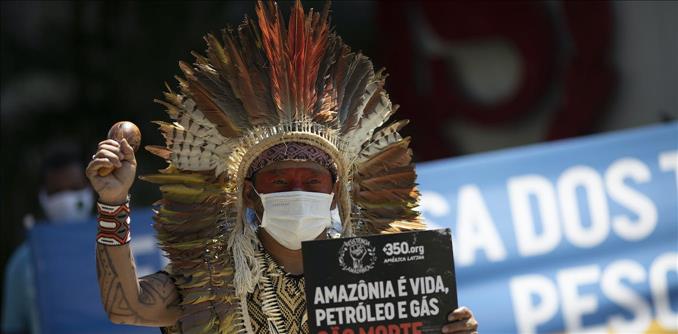(MENAFN- The Conversation) The Huni Kui Indigenous people are an integral part of the Amazon Rainforest. They don't differentiate between humans and nature. For them, there is only“nature” and humans are part of it.
They have historically put their lives on the line to protect the Amazon and, like other Indigenous land- and water-protectors, many of their leaders have in the fight against logging, mining and land grabbing. The Huni Kui also face the effects of pollution and climate destabilization.
As a hereditary Chief and elected President of the Huni Kui People of Acre, in the Amazon region in Brazil, I (Chief Ninawa Huni Kui) chose to participate at the 2022 United Nations Climate Change Conference (COP27) because the Amazon is crying out for help and my people represent the voice of this biome.
Sadly, as my co-author Vanessa Andreotti and I attend the meetings at the conference in Sharm El Sheikh, Egypt, it so far has confirmed my experiences at other COP conferences.
The vast majority of the discussions reproduce colonial patterns of unsustainable economic growth, ecological destruction and Indigenous dispossession that have been responsible for climate destabilization in the first place.
Despite extensive participation of diverse peoples and communities this year, there are fewer critical perspectives at the table. The consensus seems to be that , a carbon neutral and more“inclusive” version of capitalism, will prevent further climate catastrophe.
However, we believe that COP27 could still be an important space to co-ordinate accountable climate action for both Indigenous and non-Indigenous peoples. To do so, organizers need to emphasize critical engagement with historical, systemic and on-going harm, centre Indigenous voices and rights, and do the difficult work of repairing and rebuilding relations.
Deforestation largely benefits rich countries
In the Amazon today, temperatures are rising dangerously and atypical floods, droughts and heat domes risk food and water security.
The world's largest rainforest — The Amazon — can turn from being a carbon sink to becoming a carbon source. (AP Photo/Edmar Barros) Meanwhile, land grabbers take advantage of the severe droughts by and destroying large areas of the Amazon rainforest to make way for . These land grabs are aimed at producing .
All of this happens at the expense of the life of the forest and the Indigenous Peoples who are part of it, and creates ripple effects around the world.
The Amazon biome, also called Amazonia, hosts the Earth's largest tropical forests and the second largest river in the world. However, over the past 40 years, .
Today, the Amazon biome is close to a where the forest can turn from being a carbon sink to becoming a carbon source.
False solutions and green capitalism
Most governments and multinational corporations funding and attending COP27 seem to want to turn the climate crisis into a business opportunity, to generate profit. This commodification and commercialization of nature is what has put us in a catastrophic situation.
Most of the celebrated climate solutions, such as , and many forms of so-called , are in fact forms of“CO2lonialism” — a term coined by the . Indigenous Peoples are expected to pay the highest price for climate change mitigation, despite having the lowest levels of carbon emissions because of this CO2lonialism. At COP27, CO2lonialism is not the“elephant in the room,” it is“the room.”
Carbon trading is a false solution that enables the Global North to continue with the polluting that has destabilized the climate. (AP Photo/Jean-Francois Badias) The“green” solutions presented by government leaders and heads of corporations represent more violations of Indigenous rights and more impositions on Indigenous territories, without consultation and without consent.
For example, take the case of and the mining of , , and for the energy transition of the Global North.
and are also false solutions that enable and encourage the Global North to continue the same system of unsustainable growth and overconsumption that has destabilized the climate. are mobilized by governments in the Global South to further dispossess Indigenous Peoples of their lands and livelihoods.
Human extinction in slow motion
Even though Indigenous Peoples are most there are very few spaces where they can tell a wide audience about the challenges posed by adapting to climate change and mitigating its effects.
With , we are facing mass extinction in slow motion, including the . Until we wake up to the magnitude of this threat, the world will continue to desire the same economic model that steals the future of generations to come.
Indigenous and non-Indigenous peoples put up a stall at COP27 demanding climate reparations. (Vanessa Andreotti), Author provided The genuine process of decarbonization is a profound process of reparation of our relationship with the Earth and our relationship with and between ourselves. We need to recognize the repeated mistakes we have made and work with humility towards a new form of coexistence, a new form of relationship with the planet.
Without , we will not achieve the necessary co-ordination for local or global decarbonization. This is not an easy or painless process for those attached to the comforts and illusions of modern life.
A different future will not be possible without reverence, respect, reciprocity and responsibility towards the Earth and, on this issue, .
COP27 is still an important space for exchange of knowledge among Indigenous Peoples. It could also be a learning space for non-Indigenous people if Indigenous voices and rights were placed at the centre of climate destabilization discussions, and if reparations were on the table.
Sharon Stein, Assistant Professor of Higher Education at UBC, contributed to this article.




















Comments
No comment